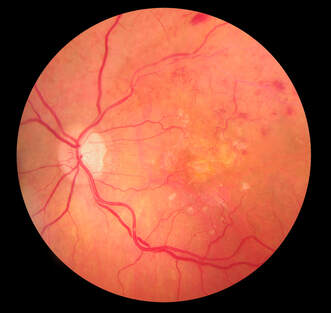What is HIV/AIDS?HIV is a virus that interferes with the body’s immune system. It attacks the cells that help fight infection. With the cells impaired, the body has a harder time fighting off diseases. If not treated, HIV can progress into acquired immunodeficiency syndrome (AIDS). The good news is treatments are available that can manage HIV and can often prevent it from progressing into advanced disease. According to the Centers for Disease Control and Prevention, in the United States, HIV is primarily spread through sex and sharing needles with someone that has the infection. The CDC also warns that substance use can indirectly contribute to your risk of contracting HIV because it may affect a person’s judgment and make them more likely to engage in risky behaviors, such as unprotected sex. What is HIV retinopathy?HIV retinopathy is damage to the vessels in the retina. The retina is made up of different parts, which sense light and send electrical signals through the optic nerve to the brain. Retinopathy involves small bleeding or blocked blood vessels in the retina. White spots, referred to as cotton wool spots, form on the retina and are often one of the ways the condition is diagnosed. According to Prevent Blindness, HIV retinopathy is one of the most common eye problems for people with HIV. Some people with HIV retinopathy do not even know they have the condition and may not have symptoms, but an eye doctor can diagnose HIV retinopathy through an eye exam. Although vision loss usually does not occur, some people may develop a small defect in their visual field. Treatment is often not needed, but it is still important to be aware you have the condition and be monitored for changes. What is CMV retinitis?Cytomegalovirus (CMV) retinitis is an opportunistic infection that affects the retina and may occur in people with advanced HIV and AIDS. An opportunistic infection occurs more often in people that have a weakened or compromised immune system. CMV retinitis causes inflammation of the retina and can threaten vision. It may occur in one eye or both. Symptoms may include:
Treatment for CMV retinitis is important to prevent vision loss. If retinitis only affects one eye, prompt treatment can prevent the spread to the other eye. Treatment includes medications, such as valganciclovir, ganciclovir, and cidofovir. In most cases, treatment is effective for CMV retinitis. PreventionManaging HIV is the best way to prevent eye complications associated with the infection. People that have HIV can reduce their risk of eye problems by doing the following:
Follow your treatment plan: Take antiviral medications as prescribed by your doctor. Keeping HIV in check is vital to prevent it from progressing to advanced disease and AIDS. Make healthy lifestyle choices: Keeping your immune system as strong as possible is helpful. Exercising, eating healthy, not smoking, and getting enough sleep are vital to maintaining good health. Have regular eye exams: See an eye doctor for regular eye exams to check for any problems before they become serious. If you have any questions about how HIV may affect your vision, we are happy to help. Also, if you would like to talk about whether an appointment with one of our eye doctors would be appropriate at this time, call our office at 508-746-8600. Comments are closed.
|
EYE HEALTH BLOGCategories
All
Archives
July 2024
|
|
Kadrmas Eye Care New England
55 Commerce Way, Plymouth, MA 02360
14 Tobey Road, Wareham, MA 02571 133 Falmouth Road (Rt 28), Mashpee, MA 02649 |
Phone Number:
1-508-746-8600 Hours: Monday through Friday — 8 AM – 4:30 PM |


 RSS Feed
RSS Feed
